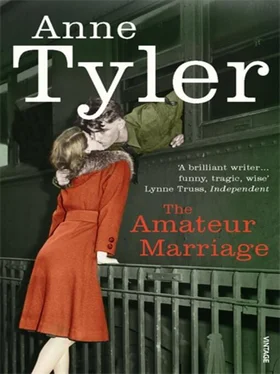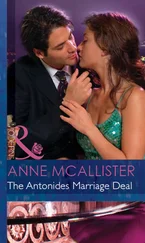“Oh, I’m okay, Mom Barclay.”
She was knitting something blue that flowed across her lap. A fire burned low in the fireplace, and music tinkled faintly from the radio with its fancy tilted dial that people didn’t have to squat to adjust. When Mr. Barclay resettled himself, he gave a groaning sigh of contentment and opened out his paper.
Michael took in the scene for a moment before he turned away and started up the stairs.
In the larger of the rear bedrooms, the one that had once been Pauline’s, Pauline stood jiggling the Barclays’ old crib in the rhythm that always put Lindy back to sleep when she was fretful. The room was dark, but enough light spilled in from the hall so that Michael could see Pauline’s expression when she raised her face to greet him. Her eyes were damp and her mouth had a vulnerable look, the two little points of her upper lip touchingly hopeful.
“Sweetheart. Pauline,” he said, and he let his cane fall to the floor and crossed the distance between them and wrapped his arms around her. He felt her tears dampening the skin just inside his collar. He was astonished all over again by how dear she was, and how fragile and slight. “I thought you’d never come for me, I thought you’d given up on me, I thought you didn’t love me,” she was whispering, and he said, “I could never give up. Of course I love you. I couldn’t not love you. I wouldn’t know how to not love you.”
Hugging her close, gazing over her head and out the tall, dark window, he saw that the snow had finally begun. Soft white flakes drifted past, so weightless they were almost not even falling. He had the feeling that if he held his breath, the two of them could stay suspended forever in this moment of stopped time.
When the telephone rang, Pauline cried, “Sit still, everybody! I’ll get that! Don’t anybody move!”
Although none of the children was stirring, in fact. Lindy and George stared at her placidly over their morning toast. Karen, who was still too little to answer the phone, continued forcing sodden Wheaties into her doll’s O-shaped mouth.
Mother Anton was shuffling down the carpeted corridor from her bedroom. When she saw Pauline approaching, she flattened herself against the wall and allowed her to race past. For Pauline wasn’t picking up the telephone in the kitchen. She was running for the one in the rec room, all the way downstairs.
“Hello?” she said, out of breath, hopping on one foot because she’d stubbed a toe in her hurry.
“Hi, hon,” her mother said.
“Oh. It’s you.”
“Well, that’s a fine welcome!”
“I was just… How are you, Mom?”
“Very well, thanks, but I can’t say the same for your sister. Seems last night she went into labor, or what she thought was labor, and so at two a.m. she telephoned, I got up, I got dressed, your dad drove me over to babysit, she and Doug went off with her little packed suitcase, and what happened? They told her it was a false alarm. ‘False alarm!’ she said. ‘It can’t be false! I’m an old hand at this! Don’t you think I’d know it if—’”
One of the children had left a comic book on the bar and now an imprint remained — smatterings of backwards type in white balloons and an image of Minnie Mouse with her big red hairbow. It was silly to have a bar, really. Neither Pauline nor Michael drank much. But Pauline planned to start throwing neighborhood parties as soon as their lives got a little less hectic, and already she was thinking ahead to sock hops once the children hit their teens, with root beer floats and such just like at a soda fountain. Besides, the bar came with the house. You could choose Plan A, B, or C, and while Plans B and C were beyond their means (or beyond her father’s means, for it was he who’d made the down payment), even Plan A, the California Ranchette, had some very impressive features, including not only the bar but a chimney-looking brick column catty-corner from it, except where the fireplace opening would have been there was a recessed cube for a TV set as soon as they could afford one.
Poor Donna had come home in tears, her mother was saying. “You know how wearisome it gets. Can’t sleep nights, can’t find the right position for your back…”
Pauline put her finger in the i on the dial and rotated it the least little bit — not quite enough to cut her mother’s voice off. Then she went a smidgen too far and her mother stopped short after “water retention.” When she released the dial her mother was saying, “… ankles dented like bread dough…” Pauline hadn’t missed a thing.
“Well, maybe I’ll call her later,” she said. “Try and boost her spirits.”
“Oh, why don’t you do that, hon. She’s just so blue and discouraged.”
“Gotta go now!” Pauline said.
And hung up, just like that.
But then stood there a moment longer staring at the phone. It didn’t ring again, however.
Upstairs, Mother Anton was emptying the cupboard next to the stove — hauling forth salt, pepper, cornstarch, sugar, tapioca. Her hair was wrapped in a kerchief that was knotted over her forehead, and her legs stuck out all white and skinny and veiny beneath her housecoat.
“Are you looking for something?” Pauline asked her.
“Prunes.”
“Sit down and I’ll get them for you. George, stop playing with your toast. Either finish it or ask to be excused. And Lindy… Lindy, what is that you’re wearing? ”
Lindy was wearing denim shorts and a lace-trimmed, puff-sleeved pink blouse — the top half of a mother-daughter outfit she had so far refused to be seen in. Every Sunday morning as they were dressing for church, Pauline would ask, “Well? Should the two of us put on our outfits?” and Lindy always said no. She wanted to wear her sailor suit; she wanted to wear her blue plaid. Anything, it seemed, but an outfit that matched her mother’s. She was such a contrary little person! Pauline had just about given up, resigned herself to waiting till the outfit could be handed down to Karen. Who was more the type for it anyway: soft and blond and blue-eyed, while Lindy had Michael’s dark coloring and — even at age seven — his angular, sharp-edged frame. Someday Lindy was going to be a beauty, Pauline believed (though she admitted she might be biased). She’d be what people called striking, arresting — someone who could carry off those clothes you saw in Vogue magazine. But meanwhile, here she stood, a crazy mix of lace and denim on a Saturday morning when Pauline herself was in pedal pushers. “Lindy,” Pauline said, “would you go put on a T-shirt, please? And hang that top on a hanger before it gets all wrinkled.”
“I’m not in the mood for a T-shirt,” Lindy told her. Chin raised defiantly, eyes squinched into splinters. Her hair hung straight as licorice sticks on either side of her face.
“Well, nobody’s going to the pool with me dressed that way,” Pauline told her. Then she turned her back and started hunting for the prunes, because you got a lot further with Lindy if you didn’t force a confrontation. For a moment nothing happened, but eventually she heard Lindy slide out of her chair and stalk away.
“ I can go to the pool,” George announced. “ I’m wearing a T-shirt.”
“Yes, Georgie. Mother Anton, I can’t find any prunes. I’m afraid you’ll have to have something else for breakfast.”
“But Dr. Stanek said prunes. He said lots of prunes and roughage.”
“How about applesauce?” Pauline asked.
“Applesauce! Are you trying to kill me? You know applesauce is binding!”
“Fruit cocktail, then. I know I saw a can of fruit cocktail, somewhere or other…”
Читать дальше












